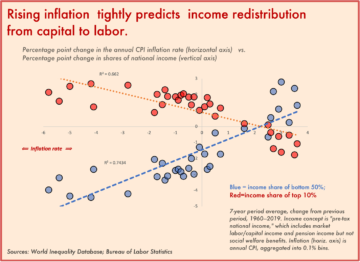 Seth Ackerman over at his substack:
Seth Ackerman over at his substack:
For all the discourse churned out in the inflation debate over the past year, there’s one question that’s gotten almost no attention: why is inflation bad, if it’s bad?
It’s an urgent question right now, because an earnest debate is underway as we speak, among central bankers, financial journalists, Wall Street analysts and the like, about whether, over the next six months or so, the Federal Reserve should more or less deliberately trigger a recession in the interests of tamping down inflation.
Any policy decision has costs and benefits. For the more vulnerable sections of the working class and working-class places, the cost of a period of job scarcity is a lasting — often permanent — residue of pretty much every kind of misery: poverty, drug addiction, chronic physical pain, school failure, broken families, mental illness. For young college graduates, it’s stunted career prospects. For the general population it’s consistently lower levels of expressed life satisfaction. (I’ll leave aside for now the consequences for the working class as a class-for-itself, a parochial concern of socialists.) All of this is now amply documented in sprawling social science literatures on job ladders, unemployment “scarring,” subjective well-being, and so on.
More here.
